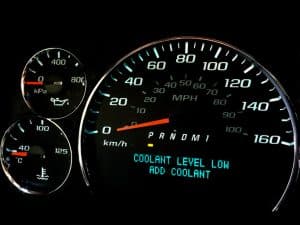 Coolant leaks are among the most common fluid leaks your vehicle can experience. These leaks are not as dangerous as a fuel leak or a serious oil leak but they can still damage your engine if they are not repaired as soon as possible. Without the proper amount of coolant, your vehicle’s engine temperature will not be regulated properly. If your engine overheats, you could end up with expensive repairs as well as your car stalling and leaving you stranded in the middle of nowhere.
Coolant leaks are among the most common fluid leaks your vehicle can experience. These leaks are not as dangerous as a fuel leak or a serious oil leak but they can still damage your engine if they are not repaired as soon as possible. Without the proper amount of coolant, your vehicle’s engine temperature will not be regulated properly. If your engine overheats, you could end up with expensive repairs as well as your car stalling and leaving you stranded in the middle of nowhere.
How to Identify Coolant Leaks
If you notice a bright green, orange, pink, red, purple, or blue stain or puddle under your vehicle that might have a sweet smell, then it is most likely a coolant leak. It’s also important to clean it up since coolant is toxic to people and animals.
Your car’s warning lights or temperature gauge are also good indicators. If you notice a sudden increase in the temperature gauge, you should check your coolant level. Of course, you should also regularly check your car’s coolant reservoir to monitor the coolant level and ensure it contains the proper amount of coolant. Once you do notice that there is a leak, you need to determine the cause. Therefore, visiting a trusted local mechanic near you like the experts at Supertech Auto Repair North Vancouver should be done the moment you suspect a leak.
The Most Common Coolant Leak Causes
Internal Component Damage
Radiator holes, split/broken hoses, a damaged water pump, heater core or engine freeze plugs can all be causes of coolant leaks. It is also possible for your coolant reservoir to crack and slowly leak coolant as well.
The radiator can begin to leak due to corrosion since as the radiator tubes get older and weaker, sediment inside them can create leaks. The water pump can leak since the hose that connects to the radiator can become loose, corrode or sustain external damage that can also cause the leak.
Radiator Cap Leaks
Due to the fact that your radiator is pressurized, if the radiator cap is loose, it can allow coolant to escape. What’s more, if the radiator cap seal has deteriorated or the spring wears out, it can also permit coolant to escape. Consequently, your radiator will lose pressure and experience a leak. However, in such a case, the leak may only be detected by conducting a pressure test of the radiator cap.
Damaged Head Gasket
When your engine’s head gasket is “blown” or damaged, you may experience internal leaks which don’t normally cause stains or puddles under your car. A damaged head gasket is unable to keep the engine oil and coolant separate which can lead to engine failure. If you notice white smoke being expelled from your vehicle’s exhaust system, it could be a sign that the coolant is mixing with your engine oil due to a damaged head gasket.
Coolant can also leak outside of the engine and prevent your engine from maintaining a proper operating temperature. Therefore, it is important when you notice that you have to refill your coolant tank more frequently to check for an internal coolant leak.
Driving with a Coolant Leak
If you do suspect your car has a coolant leak, you should visit Supertech Auto Repair North Vancouver immediately. In addition to overheating and possibly causing you costly engine repairs, coolant leaks can be hazardous to animals since the coolant fluid has a sweet smell that attracts them and as we have already mentioned, this fluid is extremely toxic both to animals and humans. For more information about coolant leaks, call us at 604-980-9801 or contact us online to book an appointment.
